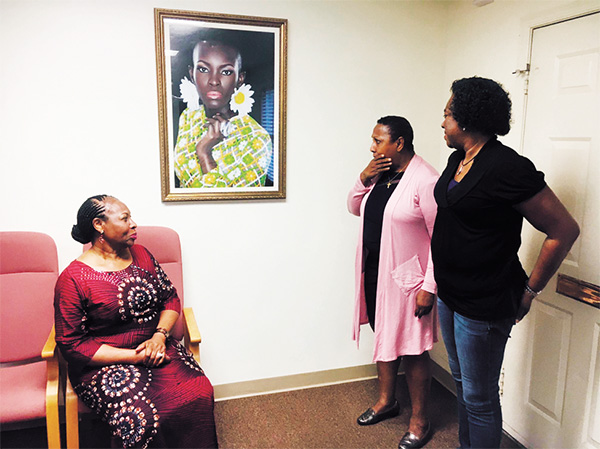Education
Breaking The Silence Around Breast Cancer In the African Community
“Explore the vital work of organizations like the African Women’s Cancer Awareness Association (AWCAA) in breaking the silence and stigma surrounding breast cancer in the African community. Through advocacy, support, and medical services, they’re empowering women to overcome barriers and access life-saving care.”
#BreastCancer #AfricanCommunity #HealthDisparities #CancerAwareness #WomenHealth #MedicalSupport

From The Howard University News Service
WASHINGTON, D.C.
According to cancer specialists at the MedStar Washington Hospital Center, D.C’s Ward 5 has the city’s highest breast cancer mortality rate in 2014. Black women also comprised 40 percent of patients with advanced-stage breast cancer. Nationally, Black women are 41 percent more likely to die from breast cancer than white women according to the Susan G. Komen Foundation.
For immigrants, the devastation of the disease is often worsened by a lack of insurance that makes it almost impossible to receive treatment. In addition, rates that illustrate continental African women’s breast cancer are often collated with those of Black American women, which can make it difficult to find specific statistics.
Ify Nwabukwu remembers her mother, a Nigerian immigrant, learning she had breast cancer after going to the doctor for a routine check-up.
“She didn’t have insurance so there was no way for me to find coverage,” said Nwabukwu. “However, I had a best friend who was a trauma surgeon, so she came together with her peers and they did [my mother’s] mastectomy pro bono- with no charges.”
This is what inspired her to start the African Women’s Cancer Awareness Association (AWCAA) in 2004. The organization provides facilitation services to African immigrant women and their families to reduce the burden cancer inevitably brings. In addition to scheduling doctor’s appointments, AWCAA also donates wigs and bras to breast cancer patients and provides translators to remove the language barrier faced by immigrants trying to receive treatment.
For Sade Macaulay, a breast cancer survivor who now works closely with AWCAA, language differences and lack of insurance present the “greatest challenge” for patients trying to receive health care. She said this also results in difficulty booking appointments and delayed waiting times at the doctor, adding on to an already strenuous journey with cancer.
Milly Terry, director for AWCAA’s Navigation and Survival Services Program, works to reverse those burdens for every woman who walks through their door.
“My main duties are to get my patients- like Sade- and navigate them, make sure they get their mammograms and sonograms,” said Terry. “We make all the appointments for them. Sometimes we go with them to surgery or chemotherapy.”
Terry acknowledges support is the determining factor in life or death for many of these women, adding that “most of them don’t have insurance or papers. If they don’t have support, some of them don’t go to the doctors. They’re scared, so the trust factor is very important for us.”
Breaking the Barriers of Silence
A poster hanging from the waiting room wall in AWCAA’s second office in Maryland reads “Breaking the Barriers of Silence.” This silence and subsequent stigma around cancer are what Terry and Nwabukwu both identify as the main reason many African women lose their lives to cancer.
“Africans don’t talk about cancer. Period,” Terry said. “They think it’s a stigma, that if you tell somebody, they’ll tell somebody and people will start to look at them so they keep it to themselves. And a lot of them lose their lives because of it.”
Bringing awareness to breast cancer motivated Terry to become heavily involved with AWCAA. She remembers her childhood best friend who was diagnosed with and ultimately died from the disease.
“I think if she had spoken and told somebody, she would be alive today.”
Terry also shares stories of two other women who also succumbed to breast cancer. One sat “in the hall with us,” at a local church AWCAA visited to give an informational session who passed two weeks after. “She never said one word to the community or the congregation… Another woman from Sierra Leone called me and said she was going to do holistic treatment. Her pastor says they’ll pray, and two weeks later she was dead.”
Nwabukwu adds that “some groups of us are so embedded in religion that we think it’s not your portion for cancer to visit you. It looks like if you have cancer you must have done something wrong.”
These stigmas fuel AWCAA’s work, which they say is “more needed” in the continent of Africa. They regularly hold mission trips- their next one scheduled to visit Nigeria, where women are often diagnosed 10 years younger on average than American women, during October’s Breast Cancer Awareness Month. They plan to take medical professionals and educators to provide medical services at no cost.
As for what young Black women can do to prevent breast cancer, Ify encourages millennials to “make sure they learn their family history. Talk to your primary care physician to start screening early.”














